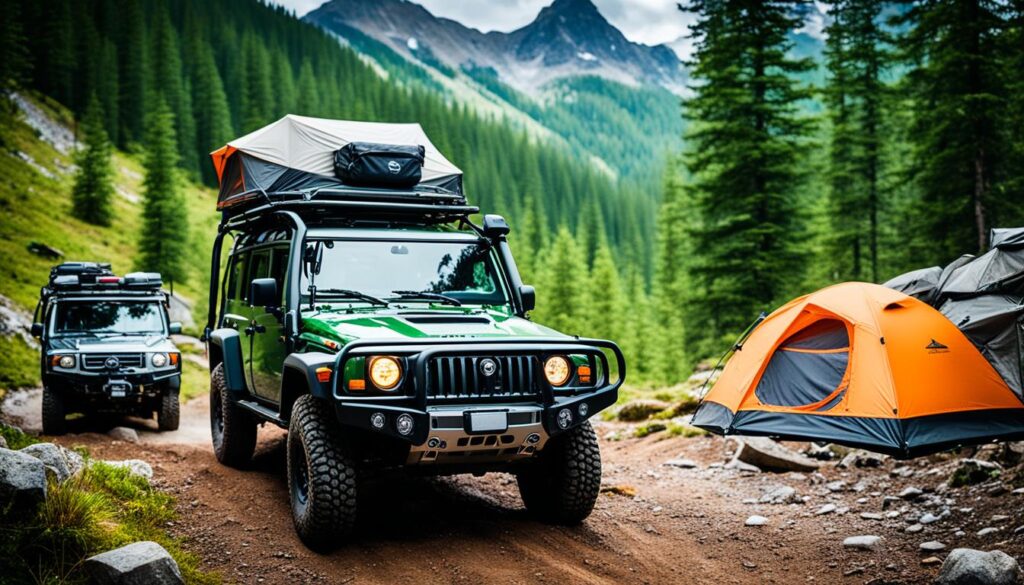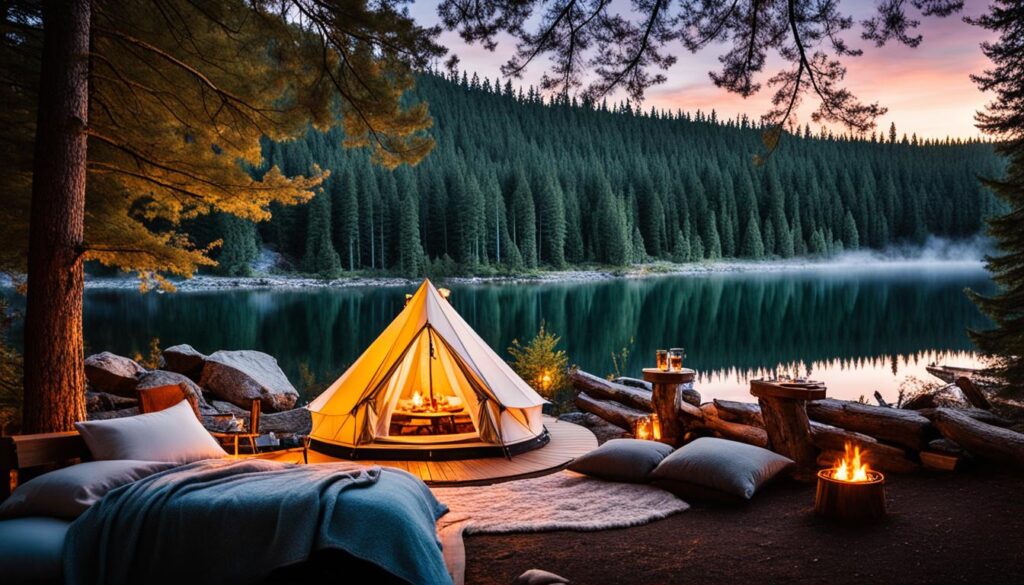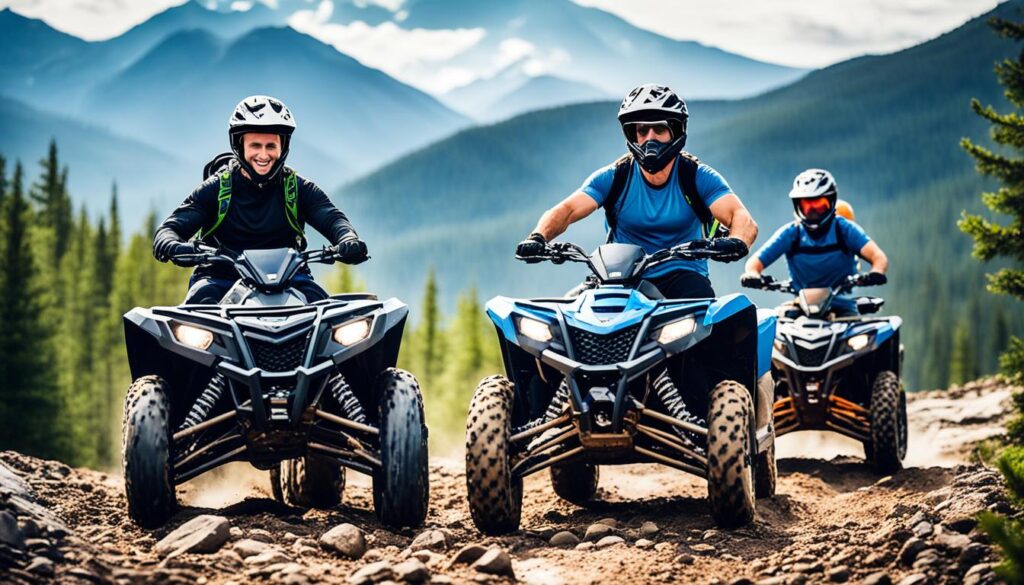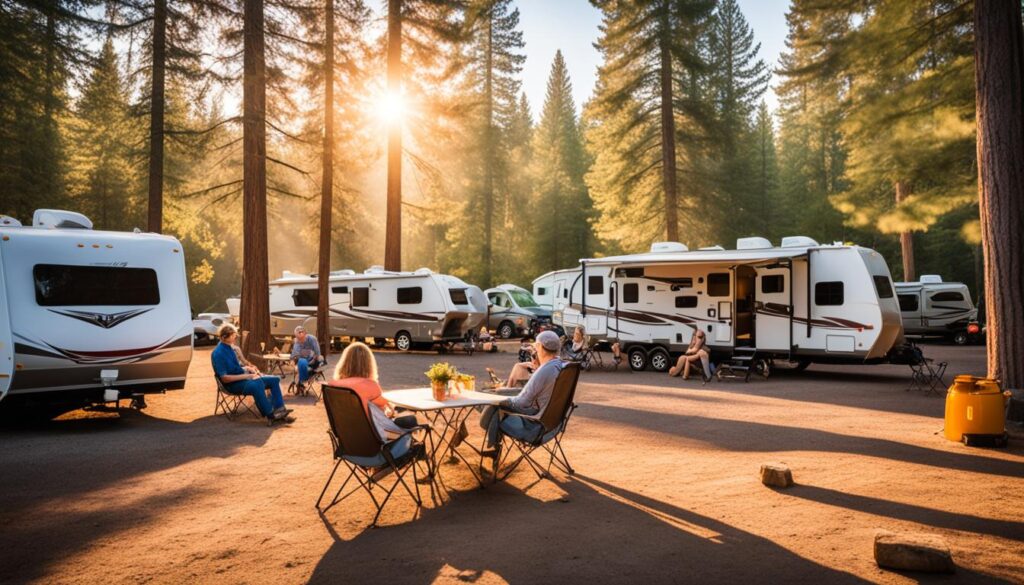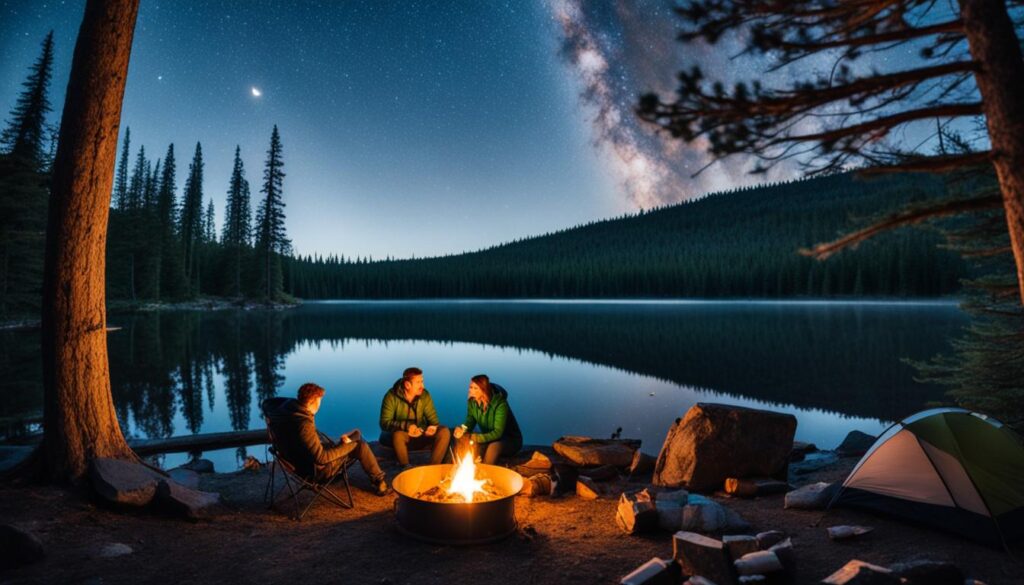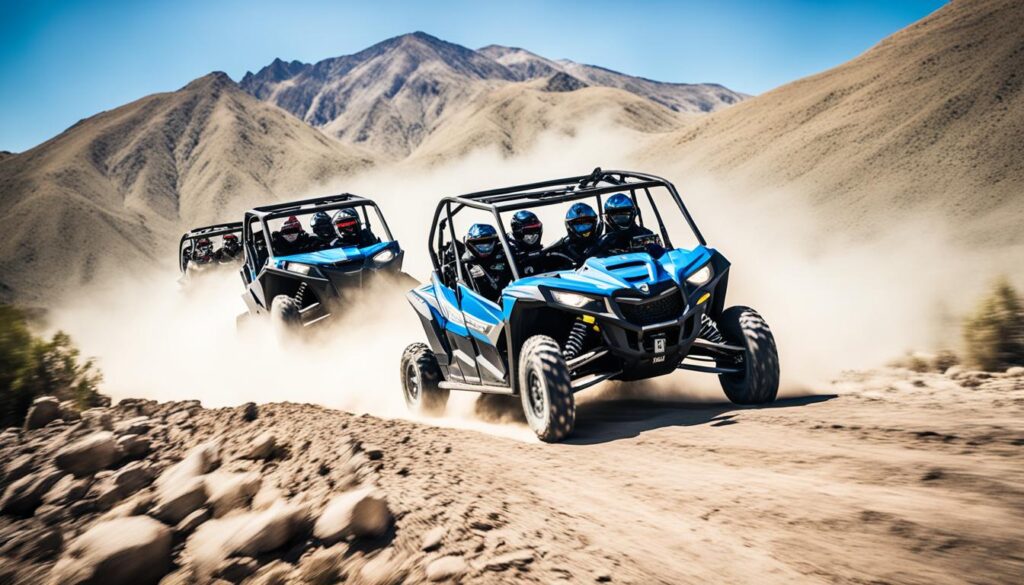Welcome to my comprehensive guide on overlanding for beginners. If you’re looking to embark on a unique and adventurous journey, overlanding is the perfect choice. It combines off-road driving, camping, and exploration to help you experience the great outdoors in an unforgettable way. In this guide, I will provide you with essential tips, advice, and recommendations to help you get started on your overlanding adventure. Whether you’re interested in choosing the right vehicle, selecting essential gear, planning your trip, or joining the overlanding community, I’ve got you covered. So let’s dive in and discover the exciting world of overlanding!
Key Takeaways:
- Overlanding combines off-road driving, camping, and exploration for a unique outdoor experience.
- Choosing the right vehicle is crucial for a successful overlanding trip.
- Essential gear includes camping equipment, navigation tools, communication devices, and emergency gear.
- Proper planning, research, and goal-setting are essential for a successful overlanding journey.
- Joining the overlanding community provides support, camaraderie, and valuable advice.
Overlanding is a form of self-reliant, vehicle-based travel that focuses on the journey rather than the destination. It offers a unique way to experience the great outdoors by combining off-road driving, camping, and exploration of remote landscapes. This immersive style of travel allows adventurers to escape the hustle and bustle of everyday life and connect with nature on a deeper level.
Unlike traditional road trips or guided tours, overlanding prioritizes self-sufficiency and independence. Overlanders typically equip their vehicles with everything needed for off-grid living, including sleeping quarters, cooking equipment, and power sources. This enables them to venture into remote and challenging environments, where they can fully immerse themselves in nature and enjoy the freedom of exploration.
Whether traversing rugged terrains, navigating scenic backcountry routes, or setting up camp in secluded areas, overlanding allows for a flexible and spontaneous travel experience. It encourages adventurers to step off the beaten path and discover hidden gems that are often inaccessible to conventional tourists.
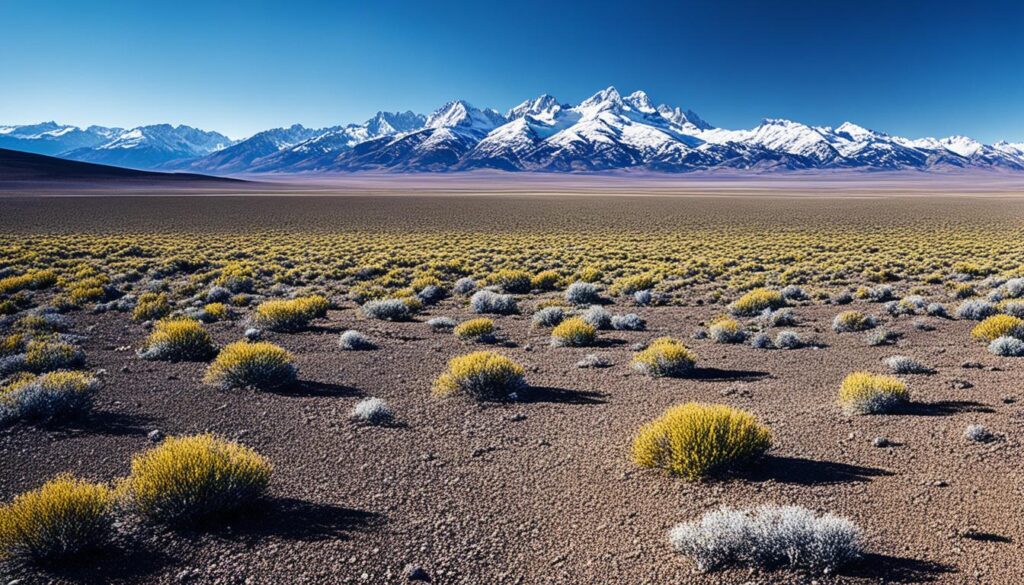
Overlanding is a blend of adventure, self-reliance, and a genuine appreciation for the great outdoors. It’s the freedom to explore off-road, camp under the stars, and wake up to stunning remote landscapes.
Overlanding is not limited to a specific type of vehicle. While many overlanders prefer four-wheel drive vehicles for their off-road capabilities, others choose adventure motorcycles, modified vans, or even bicycles. The key is to have a reliable and capable vehicle that can handle the demands of off-road driving and remote camping.
Embarking on an overlanding journey requires careful planning, preparation, and a spirit of adventure. It’s an opportunity to disconnect from the digital world, immerse oneself in nature, and embrace the challenges and rewards of self-reliant travel.
Choosing the Right Vehicle
When it comes to overlanding, selecting the right vehicle is crucial for a successful adventure. Your vehicle should be reliable, capable, and comfortable, providing you with the necessary tools to tackle rugged terrains and explore remote destinations. Consider the following factors when choosing an overlanding vehicle:
1. Reliability
Opt for a vehicle known for its dependability and durability. Reliability is vital, as you’ll be taking your vehicle into challenging environments and relying on it for transportation, accommodation, and storage.
2. Capabilities
Look for a vehicle with 4×4 capabilities and excellent off-road performance. Overlanding entails traversing rough terrains, and your vehicle should be able to handle various obstacles such as mud, sand, rocks, and steep inclines.
3. Size and Storage
Consider the size of the vehicle in relation to your travel needs. If you’re traveling solo or with a partner, a smaller vehicle may be sufficient. However, larger groups or longer trips may require more space. Additionally, ample storage options are vital for carrying essential gear and equipment.
4. Cargo Capacity
Evaluate the cargo capacity of the vehicle to ensure it can accommodate all your camping and outdoor gear. This includes items such as tents, sleeping bags, cooking equipment, water storage, and fuel supplies.
5. Fuel Efficiency
Choose a vehicle with good fuel efficiency to maximize your mileage and reduce the frequency of refueling stops. This is especially important when traveling through remote areas with limited access to fuel stations.
6. Aftermarket Parts
Consider the availability of aftermarket parts and accessories for the vehicle you choose. Over time, you may want to customize or upgrade certain aspects of your vehicle to enhance its off-road capabilities or improve comfort.
Popular Overlanding Vehicles
There are several popular vehicle options for overlanding, each with its own strengths and features:
| Vehicle Type | Advantages |
|---|---|
| Pickup Trucks | Excellent cargo capacity and towing capabilities |
| SUVs | Versatile with a balance of comfort and off-road capabilities |
| Adventure Vans | Spacious interiors and amenities for long-term travel |
Whichever vehicle you choose, ensure it aligns with your specific needs and preferences for overlanding. It’s important to thoroughly research and test drive potential vehicles to find the perfect one that will provide a reliable, capable, and comfortable platform for your overlanding adventures.
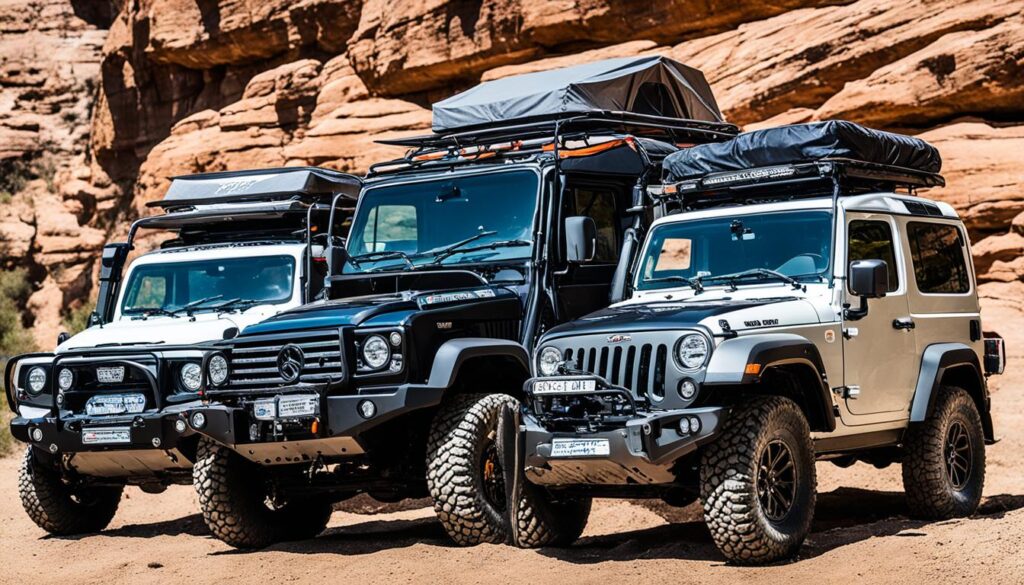
Essential Overlanding Products
Equipping your vehicle with the right products is crucial for a safe and enjoyable overlanding experience. Here are some essential overlanding products that should be on every adventurer’s checklist:
Rooftop Tent or Camping Setup
Having a comfortable and convenient sleeping arrangement is essential during overlanding trips. A roof-top tent or a camping setup provides a safe and cozy space for a good night’s sleep in remote locations.
Portable Power Station with Solar Panels
Keeping your devices charged and having access to power in the wilderness is important. A portable power station, coupled with solar panels, allows you to recharge gadgets, run small appliances, and stay connected even off the grid.
Navigation Tools
Accurate navigation is vital when venturing into unfamiliar terrain. Carry reliable navigation tools such as GPS devices, detailed maps, compasses, and altimeters to help you find your way and navigate with confidence.
Communication Tools
Staying connected and being able to reach out for help in case of an emergency is crucial. Equip yourself with communication tools like two-way radios, satellite phones, or personal locator beacons to ensure you can communicate effectively in remote locations.
Recovery Gear
Off-road adventures can sometimes lead to challenging situations. Carry recovery gear such as tow straps, recovery tracks, and a winch to help get your vehicle out of sticky situations.
Emergency Gear
Prepare for unexpected emergencies by carrying essential emergency gear such as first aid kits, emergency blankets, fire starters, and signaling devices. These items can be lifesavers in critical situations.
Cooking Gear
Enjoy delicious meals even in the wilderness with a well-equipped cooking gear setup. A camp stove, cooking utensils, and durable cookware will allow you to prepare and enjoy meals in the great outdoors.
Food Storage and Water Storage
Proper storage of food and water is crucial for extended overlanding trips. Invest in food-grade containers for safe food storage and consider carrying jerry cans or water storage solutions to ensure a reliable supply of drinking water.
Water Purification
Access to clean drinking water is essential during overlanding adventures. Carry water purification systems such as filters, tablets, or UV sterilizers to make sure you have a safe and reliable water source wherever you go.
Vehicle Maintenance Tools
Being self-sufficient on the road means being capable of handling unexpected vehicle issues. Carry a basic set of vehicle maintenance tools like wrenches, socket sets, tire repair kits, and spare parts to handle minor repairs and maintenance tasks.
By ensuring you have these essential overlanding products, you’ll be well-prepared to tackle any challenges and fully enjoy your off-road journey.
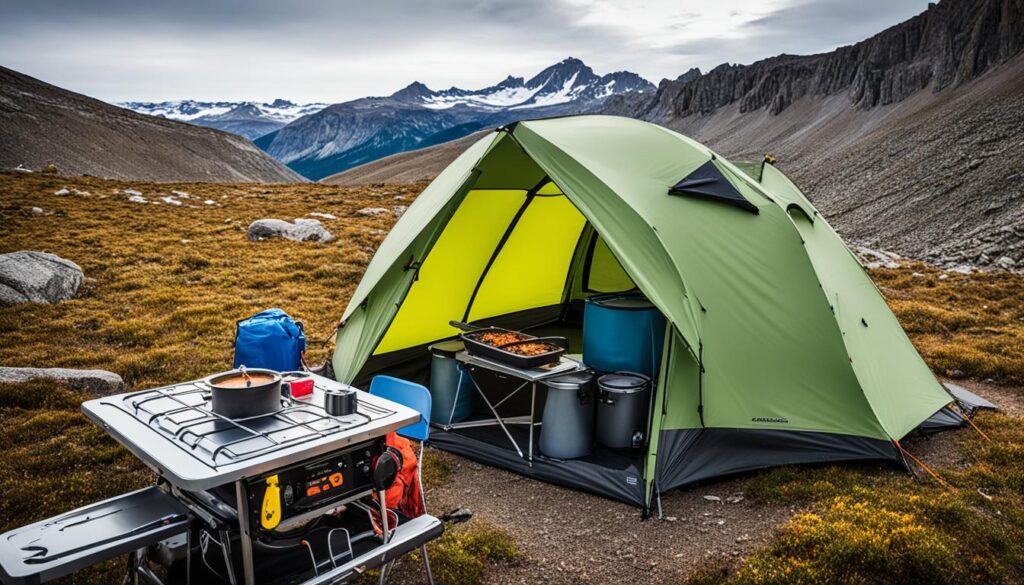
Planning Your Overlanding Journey
Proper planning is essential when embarking on an overlanding adventure. It ensures that you are well-prepared and equipped for the challenges that lie ahead. To make the most of your journey, follow these key steps:
- Research your route: Before setting off, thoroughly research your intended route. Study maps, guidebooks, and online resources to familiarize yourself with the terrain, attractions, and potential hazards along the way. This will help you make informed decisions and optimize your travel experience.
- Set realistic goals: It’s crucial to set realistic goals for your trip’s duration and pace. Consider factors such as the distance you plan to cover each day, the time you want to spend at specific locations, and any limitations you may have, such as work or family commitments. Setting achievable goals ensures a more enjoyable and less stressful journey.
- Prepare for the unexpected: Overlanding often involves venturing into remote areas where unexpected situations can arise. Plan for potential challenges such as changing weather conditions, road closures, and limited access to supplies. Carry essential emergency gear, first aid kits, and have a backup plan in case you encounter unforeseen circumstances.
- Check your gear: Before hitting the road, thoroughly inspect and test all your gear. Check your vehicle’s tires, brakes, and mechanical systems to ensure they are in good working condition. Verify that your camping equipment, cooking gear, and other essentials are clean, functional, and complete. Being proactive about gear maintenance can prevent unwanted surprises during your journey.
- Leave no trace: As responsible overlanders, it’s essential to minimize our impact on the environment. Adhere to the principles of “Leave No Trace” by practicing proper waste disposal, respecting wildlife and vegetation, and minimizing noise pollution. Leave the places you visit as untouched as possible for future generations to enjoy.
By meticulously planning your overlanding journey, you’ll set yourself up for success and ensure a fantastic experience exploring the great outdoors.
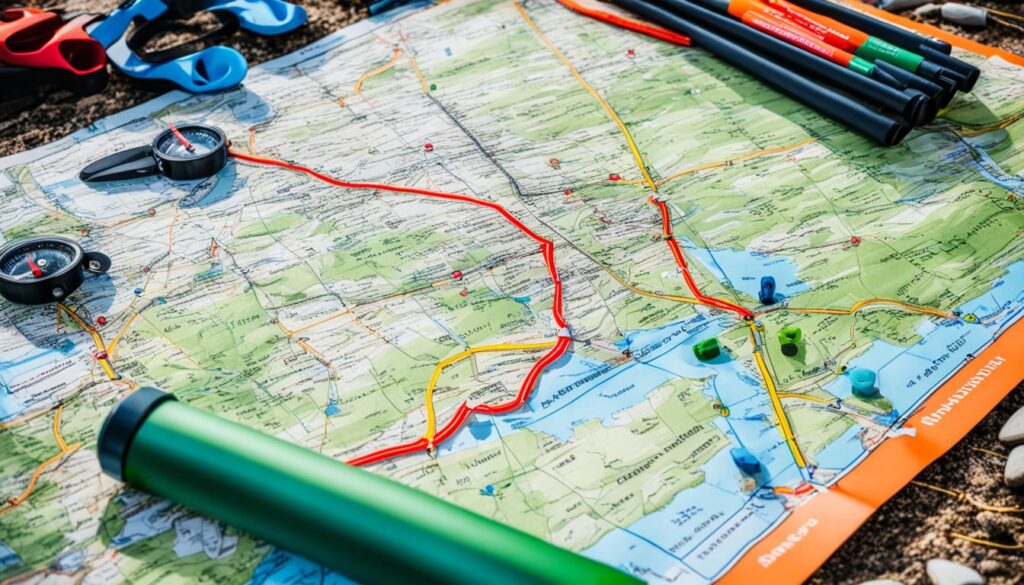
Join the Overlanding Community
Connecting with fellow overlanders can greatly enhance your overlanding experience. It allows you to tap into a wealth of knowledge, share memorable experiences, and forge lasting friendships with like-minded adventurers. Here are some ways to connect with the overlanding community:
Online Forums
Joining online forums dedicated to overlanding is a fantastic way to connect with fellow enthusiasts from around the world. These forums provide a platform to ask questions, share tips, and seek advice from experienced overlanders. Engage in discussions, learn from others’ experiences, and build relationships with a diverse community of overland travelers.
Social Media Groups
Social media platforms have become a hub for overlanders to share their journeys, exchange information, and connect with each other. Look for overlanding-specific groups on platforms like Facebook, Instagram, or Reddit. Joining these groups will provide you with a space to showcase your own adventures, learn from others, and stay up to date with the latest trends in the overlanding community.
Local Meetups and Events
Attending local meetups and events is an excellent way to meet fellow overlanders in your area. These gatherings often include group trips, vehicle showcases, and informative discussions. By participating in these events, you can connect with seasoned overlanders, swap valuable insights, and even form local overlanding clubs to plan future adventures together.
Share Experiences, Tips, and Advice
Sharing your own experiences, tips, and advice is a valuable contribution to the overlanding community. Whether it’s on online forums, social media platforms, or during local events, don’t hesitate to share your knowledge and insights. By doing so, you can inspire and educate others while fostering a supportive and collaborative atmosphere within the community.
Joining the overlanding community goes beyond simply seeking information or networking—it’s about forming connections, embracing camaraderie, and creating memories with individuals who share your passion for overlanding.
| Benefits of Joining the Overlanding Community | Online Forums | Social Media Groups | Local Meetups and Events |
|---|---|---|---|
| Access to a wealth of knowledge | ✅ | ✅ | ✅ |
| Opportunity to share experiences | ✅ | ✅ | ✅ |
| Forge lasting friendships | ✅ | ✅ | ✅ |
| Receive advice and tips | ✅ | ✅ | ✅ |
Joining the overlanding community opens up a world of possibilities, allowing you to connect with fellow adventurers, gain valuable insights, and create unforgettable memories. Embrace the spirit of community, and let the overlanding journey be as enriching as the destinations you explore.
What is Overlanding?
Overlanding is a unique form of self-sustained travel that revolves around experiencing nature and enjoying the journey. Unlike traditional travel styles that focus on reaching a specific destination, overlanding is centered on the exploration of remote areas and immersing oneself in off-road terrains.
Defined as vehicle-based travel, overlanding allows adventurers to embark on memorable journeys, connecting with the natural world along the way. It entails venturing off the beaten path and delving into challenging environments, offering an unparalleled opportunity to embrace the spirit of adventure.
Overlanding enthusiasts prioritize self-sufficiency, relying on their vehicle as a means of transportation, accommodation, and storage. This freedom to travel and camp in various locations allows for a deeper connection with nature and a truly immersive experience of the surrounding landscape.
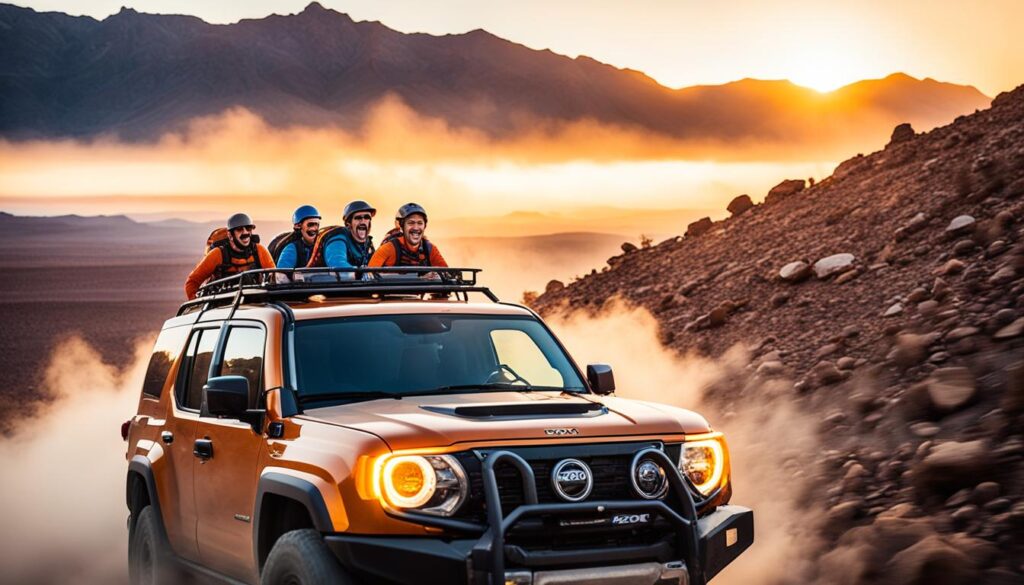
Whether navigating through rugged mountains, traversing through dense forests, or conquering sandy deserts, overlanding offers thrill-seekers a chance to tackle diverse terrains. It allows travelers to witness breathtaking natural beauty, encounter wildlife up close, and engage in personal growth through challenging outdoor experiences.
Overlanding is not just a mode of travel; it is a way of life that encourages self-reliance, adventure, and a deep appreciation for the world around us.
Experiencing Nature Firsthand
One of the main attractions of overlanding is the opportunity to connect with nature firsthand. Exploring off-road terrains provides access to remote locations that are often inaccessible through other means of travel. From camping under a starlit sky to waking up to the sounds of birds chirping, overlanders can fully immerse themselves in the natural world.
Enjoying the Journey
Unlike traditional trips, overlanding is all about the journey rather than the destination. Travelers have the freedom to set their own pace, making spontaneous stops to soak in scenic views or explore hidden gems along the way. This emphasis on enjoying the present moment and embracing the unpredictability of the road creates lasting memories and a sense of adventure.
Overlanding offers a unique blend of freedom, exploration, and an escape from the fast-paced world, allowing travelers to reconnect with nature and experience the beauty of the journey.
Whether embarking on a short weekend getaway or a multi-month expedition, overlanding provides an unmatched opportunity to break free from the confines of everyday life and embark on extraordinary adventures.
What Vehicle Do I Need?
Choosing the right vehicle is crucial for a successful overlanding experience. The type of vehicle you need depends on your preferences and the terrain you plan to explore. While any vehicle can be used for overlanding, it’s important to consider factors such as off-road capability, vehicle reliability, and appropriate features.
Off-Road Capability
When selecting an overlanding vehicle, off-road capability is essential. Look for vehicles with 4×4 capabilities and proper ground clearance to withstand rugged terrains and challenging obstacles.
Vehicle Reliability
Reliability is key when embarking on long-lasting overlanding adventures. Choose a vehicle known for its durability and dependability, reducing the chances of mechanical failures in remote locations.
Vehicle Features
Consider the specific features that enhance the overlanding experience. Features like good tires, suspension systems, and protective undercarriage can greatly improve the vehicle’s performance on rough terrains.
Weather Conditions
Take into account the weather conditions you may encounter during your overlanding trips. If you plan to travel through snowy or icy regions, a vehicle with adequate traction control and the ability to handle extreme weather conditions is necessary.
Choosing the Right Vehicle
Ultimately, the choice of vehicle should align with your specific needs and requirements. Assess your overlanding goals, the type of terrain you’ll be exploring, and the length of your trips to determine the most suitable vehicle for your overlanding adventures.
Table: Features to Consider When Choosing an Overlanding Vehicle
| Feature | Description |
|---|---|
| Off-Road Capability | Ability to handle rough terrains and challenging obstacles |
| Vehicle Reliability | Durability and dependability for long-lasting adventures |
| Vehicle Features | Good tires, suspension systems, and protective undercarriage |
| Weather Conditions | Ability to handle extreme weather conditions |
| Personal Needs | Aligning with specific overlanding goals and trip requirements |
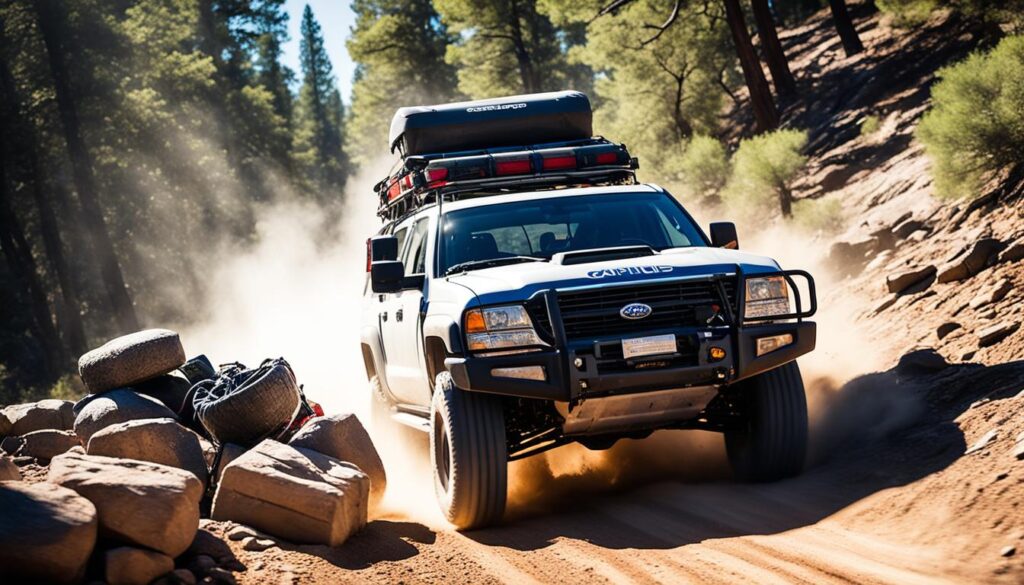
Where Should I Go?
If you’re an adventurous traveler seeking overlanding destinations, you’ll be delighted to know that there are numerous options available for your next expedition. From remote places to public lands and rural roads, the possibilities are vast.
One of the exciting aspects of overlanding is the opportunity to explore less-traveled areas and experience the true essence of adventure. Whether you’re drawn to the vast landscapes of national parks, the beauty of coastal regions, or the allure of off-the-beaten-path locations, there’s something for every intrepid explorer.
Here are some suggestions for overlanding destinations:
National Parks:
Explore the stunning natural wonders and preserved wilderness of national parks. From the grandeur of Yellowstone National Park to the awe-inspiring vistas of the Grand Canyon, these iconic destinations offer diverse landscapes that will leave you in awe.
Coastal Regions:
Embark on a coastal overlanding adventure and discover the beauty of rugged shorelines, serene beaches, and picturesque seaside towns. Whether you choose the breathtaking Pacific Coast or the charming Atlantic coastline, coastal overlanding offers a unique blend of exploration and relaxation.
Off-the-Beaten-Path Locations:
If you’re seeking truly remote and undiscovered destinations, look no further than off-the-beaten-path locations. These hidden gems provide a chance to immerse yourself in untouched landscapes and uncover hidden treasures. From secluded forest trails to desert oases, the possibilities are endless.
Remember that when overlanding, it’s essential to respect and appreciate the lands you visit. Be mindful of private property and adhere to local regulations and guidelines. Always leave the places you visit as you found them, preserving their natural beauty for future generations of adventurers.
With so many overlanding destinations awaiting your exploration, it’s time to plan your next adventure and embark on a journey of a lifetime.
| Destinations | Key Attractions |
|---|---|
| National Parks | Stunning natural landscapes, preserved wilderness, hiking trails |
| Coastal Regions | Rugged shorelines, serene beaches, picturesque seaside towns |
| Off-the-Beaten-Path Locations | Remote and undiscovered destinations, untouched landscapes, hidden treasures |
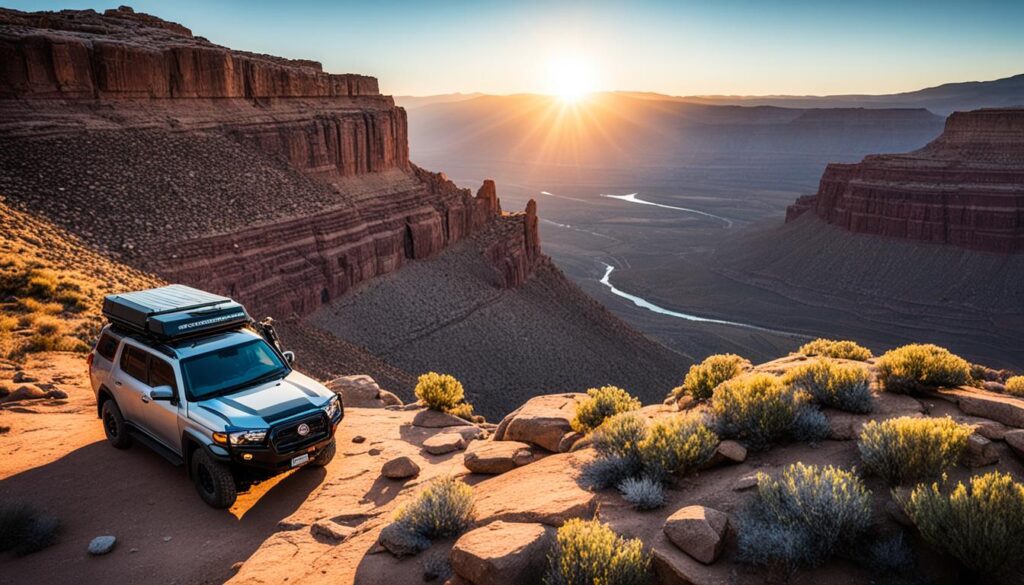
Gear You'll Need
To ensure a successful overlanding experience, it’s important to have the right gear. This includes essential camping gear such as tents, sleeping mats, cooking equipment, as well as repair gear and car advice. Optional gear may include a solar-powered fridge-freezer, a camp kitchen setup, a rooftop tent, and a shade structure. The gear chosen should align with individual preferences, needs, and the specific requirements of the overlanding trip.
Essential Overlanding Gear
When it comes to overlanding gear, there are a few essentials that every adventurer should have:
- Tent: A durable and weatherproof tent is crucial for a good night’s sleep during your overlanding journey. Look for a tent that is easy to set up and pack down, and can withstand various weather conditions.
- Sleeping Mats: Comfortable sleeping mats make all the difference when camping in remote locations. Opt for high-quality mats that provide insulation and cushioning for a restful night.
- Cooking Equipment: A portable stove, pots, pans, and utensils are essential for preparing meals on the road. Look for lightweight and compact cooking gear that is easy to clean and store.
- Repair Gear: It’s always wise to carry a basic set of repair tools, spare parts, and a tire repair kit. This will help you handle minor repairs and maintenance tasks while on your overlanding adventure.
- Car Advice: Familiarize yourself with your vehicle’s owner’s manual and carry a guidebook or online resources that provide advice on vehicle maintenance, troubleshooting, and common issues that may arise during your journey.
Optional Gear
In addition to the essentials, there are some optional gear items that can enhance your overlanding experience:
- Solar-Powered Fridge-Freezer: A solar-powered fridge-freezer allows you to keep food and beverages cool during your trip without relying on ice. This can be a game-changer for longer journeys.
- Camp Kitchen Setup: A well-equipped camp kitchen setup can make meal preparation more efficient and enjoyable. Consider investing in a portable sink, folding table, and storage solutions for your cooking utensils and ingredients.
- Rooftop Tent: A rooftop tent offers convenience and comfort, especially in areas with uneven or rough terrain. It provides a cozy sleeping space and saves valuable space inside your vehicle for other gear.
- Shade Structure: A shade structure, such as an awning or pop-up canopy, provides much-needed shelter from the sun and rain. It creates a comfortable outdoor living space where you can relax and enjoy the surroundings.
Remember, the gear you choose should align with your preferences, needs, and the specific requirements of your overlanding trip. Prioritize quality, durability, and functionality when selecting your overlanding gear to ensure a safe and enjoyable adventure.
Conclusion
Embarking on an overlanding journey is an exhilarating adventure that allows beginners to experience the thrill of exploration, the satisfaction of self-reliance, and the beauty of nature. By following essential tips and guidelines, novice overlanders can set themselves up for success. The right choice of vehicle and gear, thoughtful trip planning, and involvement in the overlanding community are crucial elements to consider.
Overlanding offers a unique blend of adventure and freedom, allowing you to immerse yourself in the great outdoors and discover hidden gems off the beaten path. Whether you choose to venture through remote landscapes, drive along challenging terrains, or camp under starlit skies, overlanding provides a one-of-a-kind experience that leaves lasting memories.
As you embark on your overlanding journey as a beginner, remember to equip yourself with the essential gear that ensures your safety, convenience, and comfort throughout the trip. Furthermore, proper planning and research will help you choose the most inspiring destinations and design an itinerary that suits your preferences. Lastly, joining the overlanding community will provide you with invaluable insights, support, and opportunities to connect with like-minded individuals who share your passion for adventure.
So, grab your gear, plot your route, pack your sense of adventure, and set off on a journey that will not only challenge you but also allow you to embrace the spirit of overlanding—a perfect blend of exploration, self-reliance, and a strong sense of community. Have a fantastic overlanding experience and enjoy the freedom of the open road!
FAQ
What is overlanding?
Overlanding is a form of self-reliant, vehicle-based travel focused on the journey rather than the destination. It combines off-road driving, camping, and exploration, allowing travelers to experience the great outdoors in a unique way.
How do I choose the right vehicle for overlanding?
When choosing a vehicle for overlanding, consider factors such as 4×4 capabilities, off-road performance, size, storage, cargo capacity, fuel efficiency, availability of aftermarket parts and accessories. Popular choices include pickup trucks, SUVs, and adventure vans.
What are the essential overlanding products I should have?
Essential overlanding products include a roof-top tent or camping setup, a portable power station with solar panels, navigation tools, communication tools, recovery gear, emergency gear, cooking gear, food storage, water storage, water purification system, and vehicle maintenance tools.
How do I plan an overlanding trip?
To plan an overlanding trip, research your route, study maps and guidebooks, set realistic goals for the duration and pace of your trip, prepare for unexpected circumstances, check your gear before departing, and practice leave no trace principles to minimize your impact on the environment.
How can I connect with other overlanders?
You can connect with other overlanders by joining online forums, social media groups, attending local meetups and events to share experiences, tips, and advice with like-minded adventurers.
What is overlanding and how does it differ from regular travel?
Overlanding is defined as self-sustained travel dependent on a vehicle, taking place on off-road terrain. The goal of overlanding is to experience nature and enjoy the journey, rather than focusing on reaching a set destination. It allows travelers to explore remote and challenging environments, immersing themselves in the natural world.
What type of vehicle do I need for overlanding?
The type of vehicle you need for overlanding depends on your preferences and the terrain you plan to explore. While any vehicle can be used for overlanding, it’s important to consider off-road capability, vehicle reliability, and appropriate features such as good tires. The choice of vehicle should align with the specific needs and requirements of your overlanding trips.
Where can I go overlanding?
Overlanding offers a wide range of destination possibilities, from public lands to private land and rural roads. Exploring remote and less-traveled areas allows for a truly adventurous experience. Whether it’s national parks, coastal regions, or off-the-beaten-path locations, there are numerous options for overlanding destinations, offering unique landscapes and opportunities for exploration.
What gear do I need for overlanding?
To ensure a successful overlanding experience, it’s important to have the right gear. This includes essential camping gear such as tents, sleeping mats, cooking equipment, as well as repair gear and car advice. Optional gear may include a solar-powered fridge-freezer, a camp kitchen setup, a rooftop tent, and a shade structure. The gear chosen should align with individual preferences, needs, and the specific requirements of the overlanding trip.
How can I start overlanding as a beginner?
Overlanding is an exciting adventure that offers opportunities for exploration, self-reliance, and connection with nature. By following essential tips and guidelines for beginners, choosing the right vehicle and gear, planning your trip, and joining the overlanding community, you can embark on a successful and unforgettable overlanding journey. Embrace the spirit of adventure and enjoy the freedom of the open road as you explore the great outdoors.
